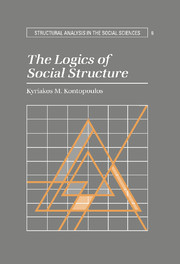Part III - Logics of hierarchy
Published online by Cambridge University Press: 24 October 2009
Summary
In this part we focus on the hierarchical logics, the symmetrical anti-pode of constructionism. Here the emergence of structure is seen not as a standard byproduct of properly aggregated individual actions, but as a complex derivative of other significant – quasi-local, quasi-global, and/or global – higher-level processes, involving different mechanisms of structuration, phase-separation, and nonlinear coupling of lower structures. Furthermore, individual action is now considered to be parameterized by the structural characteristics of higher levels, which are treated as autonomous and as exerting downward causation over such action.
Chapter 8 is intended as the opposite of Chapter 5: The focus is on “methodological holism” as opposed to the “methodological individualism” we discussed there. Here we present an analytical summation of various versions of functionalism, the mark of all kinds of holism, and proceed to appraise holism's prospects in view of the radical changes taking place in the fields of physical chemistry, molecular biology, evolutionary theory, and ecosystems modeling – fields out of which the original functionalist notions were derived. On the basis of these recent developments we posit a postfunctional mode of analysis as the only available path for former functionalists.
In Chapter 9 we explore a number of incipient hierarchical conceptions of social structure (Bunge, Hemes), and then turn our attention to the “received view” of Marxist theory, which appears as an exemplary instance of a dynamic hierarchical logic (with its emphasis on subsumption and on the logic of capital).
- Type
- Chapter
- Information
- The Logics of Social Structure , pp. 151 - 152Publisher: Cambridge University PressPrint publication year: 1993



